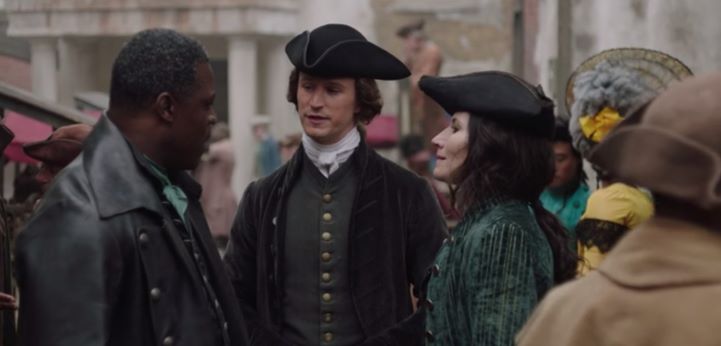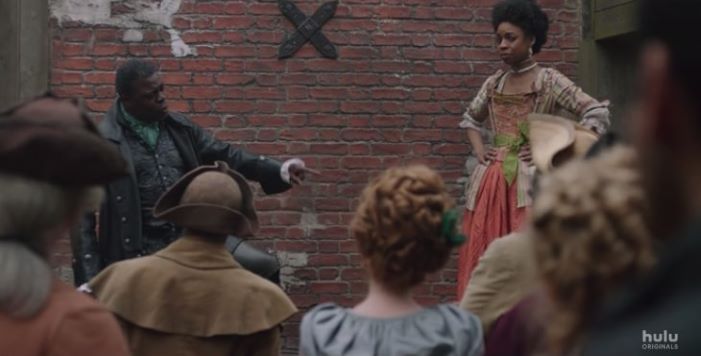Harlots, Hulu’s original period piece set in 18th century London from the perspective of women working in prostitution, is almost done with its third season. In episode seven, the series feels different, and that’s not a bad thing. The Wells have moved from the center of the story to periphery and the show is starting to focus on new characters as well as old characters who have moved to a new light.
While episode seven has a thread in the story tied to Lucy Wells, it’s more so an episode that focuses on expanding stories that have been set up in the background of the season so far. Now, we watch Elizabeth’s past finally catch up with her as she brings Lucy down with her, the threat of debtor’s jail, while Lydia Quigley (Lesley Manville) is still focused on helping the Marquess of Blayne (Julian Rhind-Tutt) to secure her phoenixlike survival of Bedlam. Meanwhile, Charlotte’s murder is no longer central to the story of the season as Nancy’s (Kate Fleetwood) murder of Isaac Pincher impacts those around her as they attempt to keep the secret in light of discovering that it was really his brother, Hal (Ash Hunter), who killed their friend.
Last episode, we saw Salabat, Elizabeth’s (Angela Griffin) new husband, come with his men to take their belongings, furniture, silks, and anything they can carry to pay for their debt. Now, Salabat is gone, Elizabeth and Frado are attempting to leave, and Lucy is defiant. She deals with crawling out of debt while also continuing her charge against the Marquess of Blayne as Lord Croft prepares to help her seek justice. But her movements are a twisted sense of motherly protection. Quigley puts the threat of debtor’s jail over Lucy’s head. Quigley seemingly does this to keep the Marquess away from Lucy but she also reaps the benefits of securing herself a larger piece of her old home Golden Square.

That said, the best part of episode seven is watching Harriet (Pippa Bennett-Warner) and William finally begin to take a larger part in the story as they mobilize people to act and hopefully save Jack, who was abducted to Lord Leadsom (Nicholas Burns) to be sent to one of his plantations. The practice of abducting free-men and women and sending them to America, stripping them of their names, and as William explains, their dignity, is a historical reality. In season two, we saw Harriet come close to the same fate.
As William and Harriet take to the street to garner support, for once, characters in this series move with a Justice behind them. Justice Knox has proved himself a good man, one of the few in the series but one of many this season. While his hands are tied given Leadsom’s standing in the city, he does offer up intelligence that will help save Jack, presumably in the season finale next week.
Episode seven also sees an examination of the power Kate Quigley (Daisy Head) is coming in to. While she remains cautious of Lydia, she is now moving forward for herself. After confronting the Marquess of Blayne last episode, I was half-convinced that Harlots would have her begin to lose her spark, the one she worked to stoke after escaping Bedlam. Thankfully, she doesn’t.
Instead, in one of the more powerful moments of the series, she takes control of a sexual situation with Prince Harry (Jojo Macari), who is harming her. When it is revealed that the Prince’s choice to hurt her during sex was at the suggestion of the Marquess, something changes in the situation, Kate gains control. Having fallen for Kate, she’s able to teach him, overwriting what the Marquess has tried to show him, and hopefully keeping him from becoming a monster.

While more happens this episode with the other characters, like Emily Lacey and Lady Fitzwilliams, episode seven’s importance to the series comes from its transition of secondary characters to the front of the narrative. For too long, period pieces have kept people of color from their narratives, but Harlots doesn’t make this excuse. Instead, the series has explored the way the world treats its Black characters, Harriet, William, and Jack, without creating a narrative of pain for them. Instead, as it does with the other characters in the series, the showrunners showcase the agency of these characters and how they push back on the world around them.
Harlots also features both Elizabeth and Hal, whose stories are not tied to a narrative about slavery, but instead cast around circumstances that any other character in the show could experience. In fact, they share their stories with white characters. Allowing the period piece to both explore the Black experience in London in the 18th century as it does with other characters, while also expanding beyond the narrative of escaping, evading, and fighting against slavery.
Episode seven has built up anticipation for the season finale next week. It has also proven that the show remains both good and important even after Charlotte, the main character, and who we thought to be the future of the series at the end of season two, gone. With one episode remaining, there is a lot to wrap up, but so much more to expect from a fourth season, if the series is renewed.
New episodes of Harlots are available to stream on Hulu Wednesday mornings.
'Harlots,' Season 3 - Episode 7
-
Rating - 10/1010/10
TL;DR
Episode seven has built up anticipation for the season finale next week. It has also proven that the show remains both good and important even after Charlotte, the main character, and who we thought to be the future of the series at the end of season two, gone.





